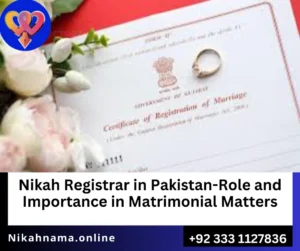
Karachi, Lahore, Islamabad, Rawalpindi
Nikah Nama Form: Recording Dower in the Nikah Nama in Pakistan
Nikah Nama Form: Recording Dower money in the Nikah Nama in Pakistan
Recording Dower in the Nikah Nama:
In the Nikah Nama, there are four columns for recording dower; each column may not apply to all marriages.
All dower amounts, regardless of form, must be stated in column 13.
In column 14, the dower money is distributed according to how much of the total deal is deferred (ghair moajal or mowajal) and how much is prompt (moajal). In this column, it should be clearly stated whether there is no prompt or deferred division of dower. There will be no division of the dower in the event there is none, and the entire dower will be considered prompt.
When the Nikah was performed, column 15 asks whether something of the Mahar was paid. It should be clearly indicated in this column if any part of the dower is paid at the time of Nikah, or if the entire dower is paid. When filling out column 15, it is advisable to verify that the payment has actually been made.

A place should be provided in column 16 if any property is being given, either as reimbursement for parts of the dower or as a reimbursement for the entire amount. As part of this column, it is also asked for the specifications of any property that is given (including its type, size, etc.).
Based on the agreement between the parties, and the value. In the case of a particular Nikah, it is important to carefully fill out all of these aspects. The bride may have difficulty claiming the property mentioned in her Nikah Nama if these details are missing.
No matter whether the title deed is registered or not, the property given in the dower becomes the wife’s property
As of yet, no transfer has taken place.
Unless it is proved to be forged, a registered Nikah Nama is admissible as evidence. Despite the nikkah not being registered, she would still be able to claim the property even if it wasn’t registered. Consequently, the bride will be required to present additional evidence to prove that the giving of the property was actually agreed upon by both parties. On the basis of a registered Nikah Nama, any physical or intangible property that is given as a dower to the wife can be transferred to her in her name. A transfer of property does not require the following rules/formals. In the absence of a transfer in her name, a woman cannot be deprived of her property.
If In the Nikah Nama, the bride is supposed to receive some property that does not constitute a dower amount. The such property falls under the Hiba-bin-evz category, and even if the bride does not possess the property physically, the law assumes that she does.
Dower property cannot be pre-empted by another party once the woman has acquired it. The property is protected. In contrast, a girl who is receiving property in dower may file for pre-emption of land adjacent to her property.
It is the right of a person or entity to acquire newly arising property before others can have access to it. Property acquired by a bride as part of her dower cannot have a suit for pre-emption filed against it by anyone.
As mandated by the laws of the Province of Punjab, it is mandatory that the person solemnizing a marriage (the Nikah Registrar or any third-party official) must fill out all columns of the Nikah Nama with specific answers concerning either the bride or the groom.
If this is violated, a fine of twenty-five thousand rupees and imprisonment of up to one month will result.


